Sustainable Integrated Marketing Communications in Nigerian Energy
VerifiedAdded on 2022/09/08
|70
|21749
|16
Project
AI Summary
This assignment presents a comprehensive literature review focusing on the development of sustainable integrated marketing communications (IMC) within the energy industry of Nigeria, with a specific emphasis on renewable energy (RE). The review begins with a general overview of RE development, the genesis of oil companies in Nigeria's crude energy sector, and the economic benefits derived from the oil boom. It then explores alternatives to crude oil, particularly RE, and examines Nigeria's transition towards RE, including the potential economic benefits. The review also encompasses comparisons of RE adoption in other countries, available technologies, and the financial aspects of RE, including charity funding and affordability. The methodology section outlines the research approach, design, data collection, and analysis methods, as well as the research philosophy. The assignment aims to develop a sustainable IMC framework for wider RE usage in Nigeria, addressing the challenges and opportunities within the emerging economy. The literature review is designed to identify key findings and gaps to inform the development of a robust research methodology.
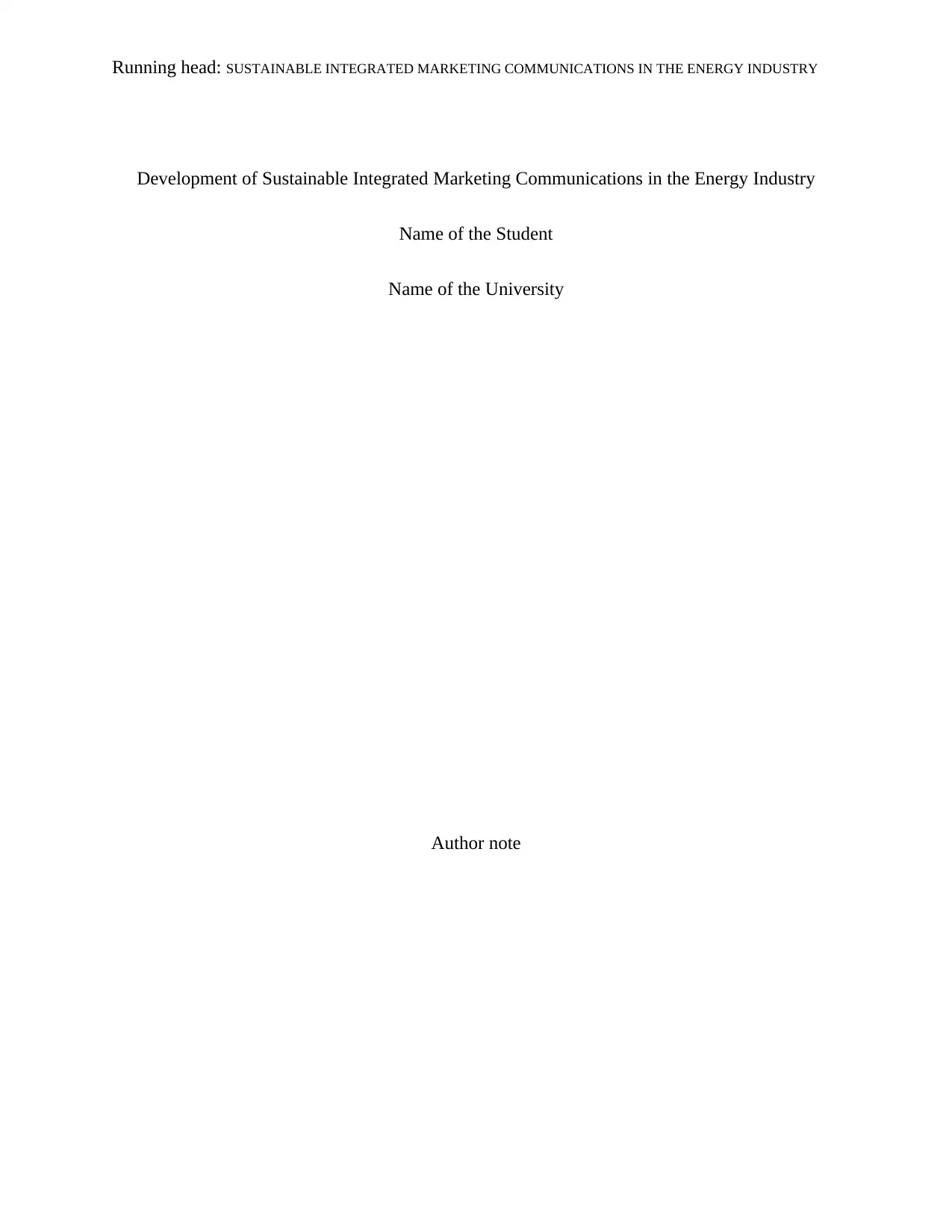
Running head: SUSTAINABLE INTEGRATED MARKETING COMMUNICATIONS IN THE ENERGY INDUSTRY
Development of Sustainable Integrated Marketing Communications in the Energy Industry
Name of the Student
Name of the University
Author note
Development of Sustainable Integrated Marketing Communications in the Energy Industry
Name of the Student
Name of the University
Author note
Paraphrase This Document
Need a fresh take? Get an instant paraphrase of this document with our AI Paraphraser
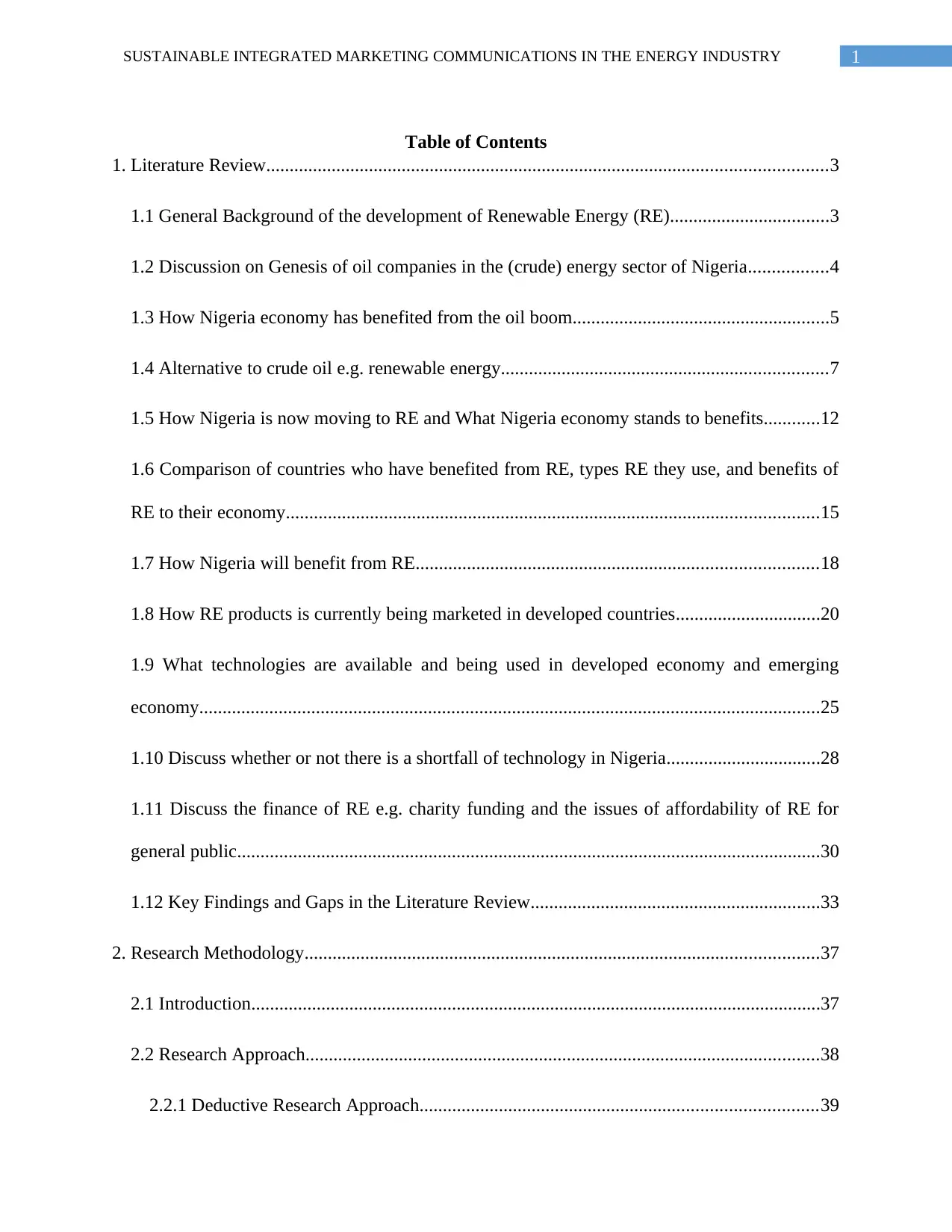
1SUSTAINABLE INTEGRATED MARKETING COMMUNICATIONS IN THE ENERGY INDUSTRY
Table of Contents
1. Literature Review........................................................................................................................3
1.1 General Background of the development of Renewable Energy (RE)..................................3
1.2 Discussion on Genesis of oil companies in the (crude) energy sector of Nigeria.................4
1.3 How Nigeria economy has benefited from the oil boom.......................................................5
1.4 Alternative to crude oil e.g. renewable energy......................................................................7
1.5 How Nigeria is now moving to RE and What Nigeria economy stands to benefits............12
1.6 Comparison of countries who have benefited from RE, types RE they use, and benefits of
RE to their economy..................................................................................................................15
1.7 How Nigeria will benefit from RE......................................................................................18
1.8 How RE products is currently being marketed in developed countries...............................20
1.9 What technologies are available and being used in developed economy and emerging
economy.....................................................................................................................................25
1.10 Discuss whether or not there is a shortfall of technology in Nigeria.................................28
1.11 Discuss the finance of RE e.g. charity funding and the issues of affordability of RE for
general public.............................................................................................................................30
1.12 Key Findings and Gaps in the Literature Review..............................................................33
2. Research Methodology..............................................................................................................37
2.1 Introduction..........................................................................................................................37
2.2 Research Approach..............................................................................................................38
2.2.1 Deductive Research Approach.....................................................................................39
Table of Contents
1. Literature Review........................................................................................................................3
1.1 General Background of the development of Renewable Energy (RE)..................................3
1.2 Discussion on Genesis of oil companies in the (crude) energy sector of Nigeria.................4
1.3 How Nigeria economy has benefited from the oil boom.......................................................5
1.4 Alternative to crude oil e.g. renewable energy......................................................................7
1.5 How Nigeria is now moving to RE and What Nigeria economy stands to benefits............12
1.6 Comparison of countries who have benefited from RE, types RE they use, and benefits of
RE to their economy..................................................................................................................15
1.7 How Nigeria will benefit from RE......................................................................................18
1.8 How RE products is currently being marketed in developed countries...............................20
1.9 What technologies are available and being used in developed economy and emerging
economy.....................................................................................................................................25
1.10 Discuss whether or not there is a shortfall of technology in Nigeria.................................28
1.11 Discuss the finance of RE e.g. charity funding and the issues of affordability of RE for
general public.............................................................................................................................30
1.12 Key Findings and Gaps in the Literature Review..............................................................33
2. Research Methodology..............................................................................................................37
2.1 Introduction..........................................................................................................................37
2.2 Research Approach..............................................................................................................38
2.2.1 Deductive Research Approach.....................................................................................39
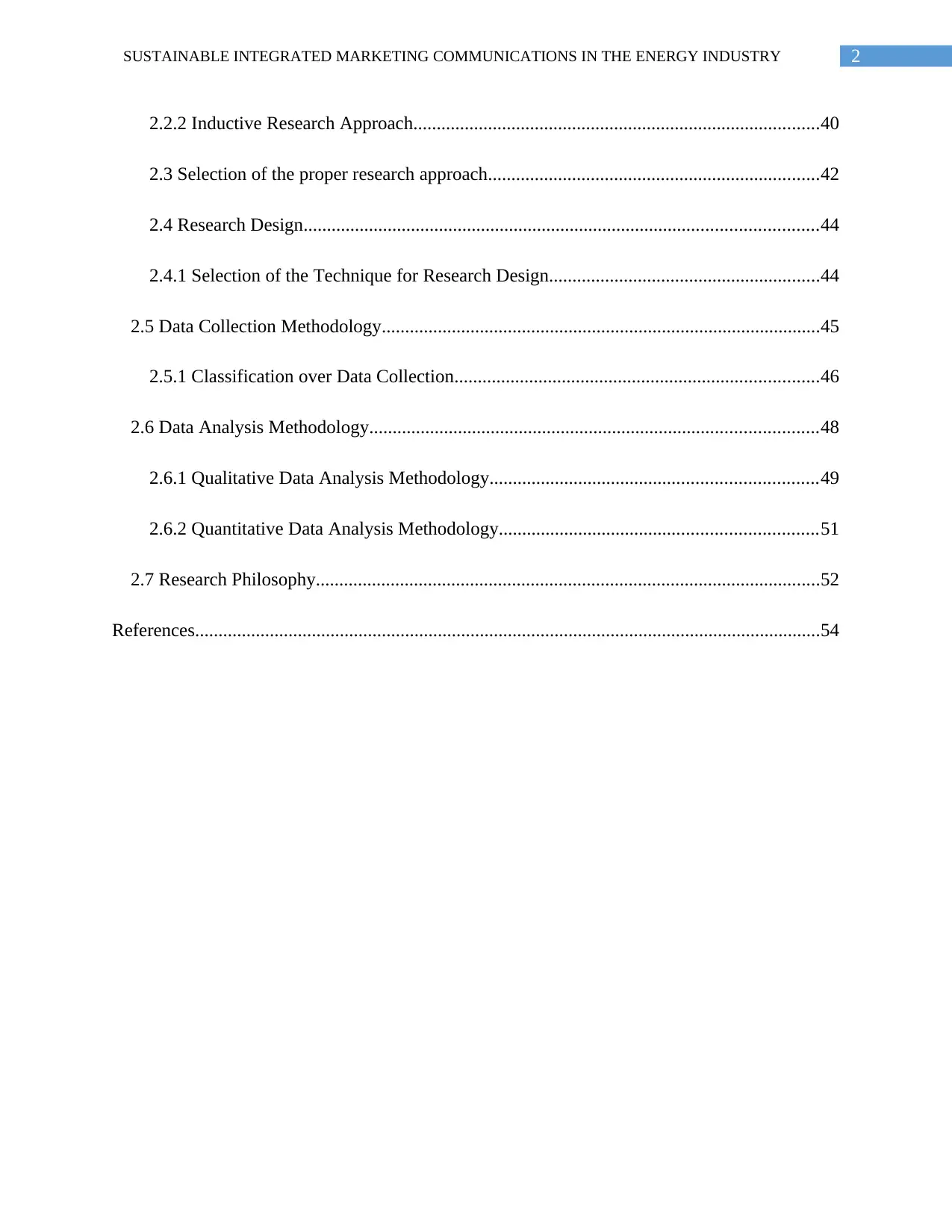
2SUSTAINABLE INTEGRATED MARKETING COMMUNICATIONS IN THE ENERGY INDUSTRY
2.2.2 Inductive Research Approach.......................................................................................40
2.3 Selection of the proper research approach.......................................................................42
2.4 Research Design..............................................................................................................44
2.4.1 Selection of the Technique for Research Design..........................................................44
2.5 Data Collection Methodology..............................................................................................45
2.5.1 Classification over Data Collection..............................................................................46
2.6 Data Analysis Methodology................................................................................................48
2.6.1 Qualitative Data Analysis Methodology......................................................................49
2.6.2 Quantitative Data Analysis Methodology....................................................................51
2.7 Research Philosophy............................................................................................................52
References......................................................................................................................................54
2.2.2 Inductive Research Approach.......................................................................................40
2.3 Selection of the proper research approach.......................................................................42
2.4 Research Design..............................................................................................................44
2.4.1 Selection of the Technique for Research Design..........................................................44
2.5 Data Collection Methodology..............................................................................................45
2.5.1 Classification over Data Collection..............................................................................46
2.6 Data Analysis Methodology................................................................................................48
2.6.1 Qualitative Data Analysis Methodology......................................................................49
2.6.2 Quantitative Data Analysis Methodology....................................................................51
2.7 Research Philosophy............................................................................................................52
References......................................................................................................................................54
⊘ This is a preview!⊘
Do you want full access?
Subscribe today to unlock all pages.

Trusted by 1+ million students worldwide
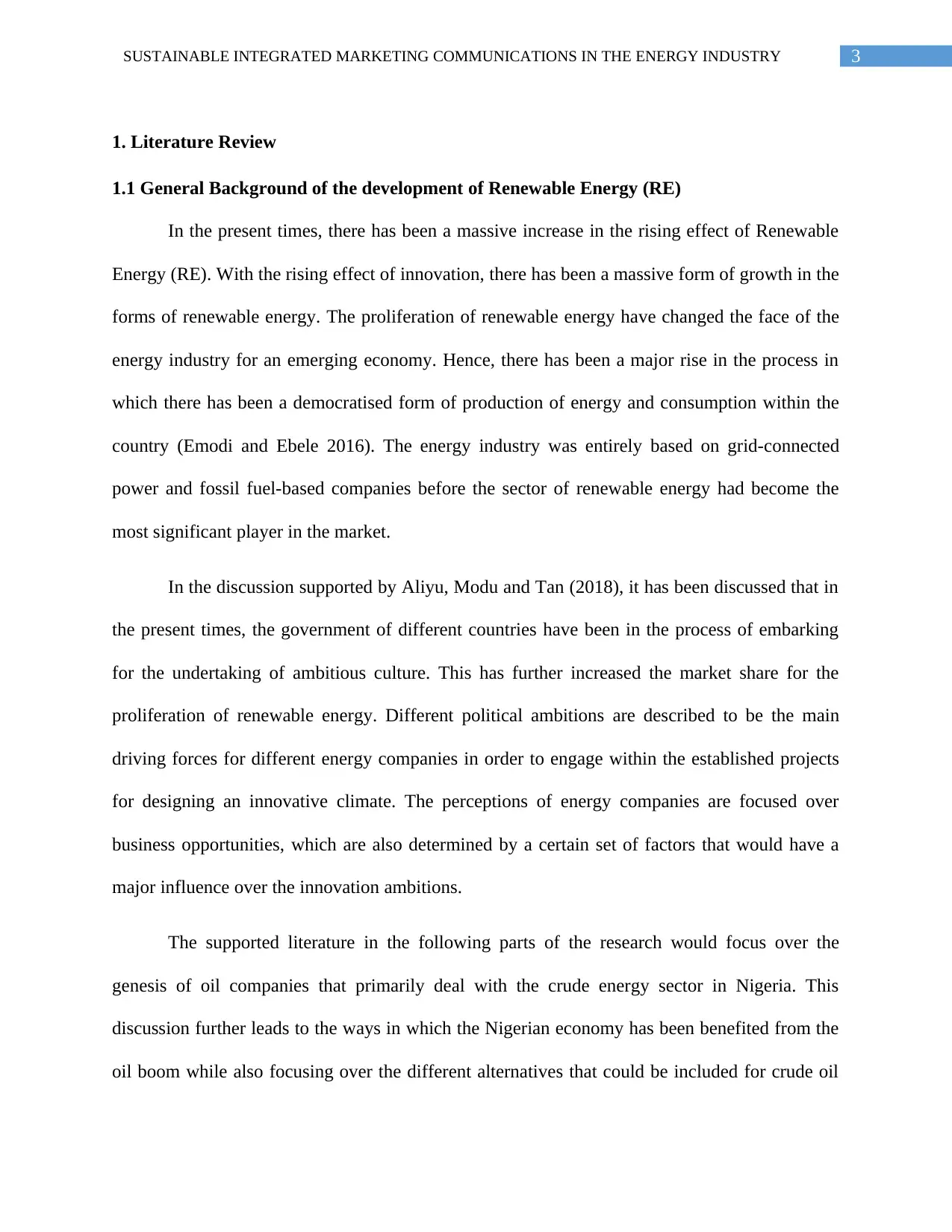
3SUSTAINABLE INTEGRATED MARKETING COMMUNICATIONS IN THE ENERGY INDUSTRY
1. Literature Review
1.1 General Background of the development of Renewable Energy (RE)
In the present times, there has been a massive increase in the rising effect of Renewable
Energy (RE). With the rising effect of innovation, there has been a massive form of growth in the
forms of renewable energy. The proliferation of renewable energy have changed the face of the
energy industry for an emerging economy. Hence, there has been a major rise in the process in
which there has been a democratised form of production of energy and consumption within the
country (Emodi and Ebele 2016). The energy industry was entirely based on grid-connected
power and fossil fuel-based companies before the sector of renewable energy had become the
most significant player in the market.
In the discussion supported by Aliyu, Modu and Tan (2018), it has been discussed that in
the present times, the government of different countries have been in the process of embarking
for the undertaking of ambitious culture. This has further increased the market share for the
proliferation of renewable energy. Different political ambitions are described to be the main
driving forces for different energy companies in order to engage within the established projects
for designing an innovative climate. The perceptions of energy companies are focused over
business opportunities, which are also determined by a certain set of factors that would have a
major influence over the innovation ambitions.
The supported literature in the following parts of the research would focus over the
genesis of oil companies that primarily deal with the crude energy sector in Nigeria. This
discussion further leads to the ways in which the Nigerian economy has been benefited from the
oil boom while also focusing over the different alternatives that could be included for crude oil
1. Literature Review
1.1 General Background of the development of Renewable Energy (RE)
In the present times, there has been a massive increase in the rising effect of Renewable
Energy (RE). With the rising effect of innovation, there has been a massive form of growth in the
forms of renewable energy. The proliferation of renewable energy have changed the face of the
energy industry for an emerging economy. Hence, there has been a major rise in the process in
which there has been a democratised form of production of energy and consumption within the
country (Emodi and Ebele 2016). The energy industry was entirely based on grid-connected
power and fossil fuel-based companies before the sector of renewable energy had become the
most significant player in the market.
In the discussion supported by Aliyu, Modu and Tan (2018), it has been discussed that in
the present times, the government of different countries have been in the process of embarking
for the undertaking of ambitious culture. This has further increased the market share for the
proliferation of renewable energy. Different political ambitions are described to be the main
driving forces for different energy companies in order to engage within the established projects
for designing an innovative climate. The perceptions of energy companies are focused over
business opportunities, which are also determined by a certain set of factors that would have a
major influence over the innovation ambitions.
The supported literature in the following parts of the research would focus over the
genesis of oil companies that primarily deal with the crude energy sector in Nigeria. This
discussion further leads to the ways in which the Nigerian economy has been benefited from the
oil boom while also focusing over the different alternatives that could be included for crude oil
Paraphrase This Document
Need a fresh take? Get an instant paraphrase of this document with our AI Paraphraser
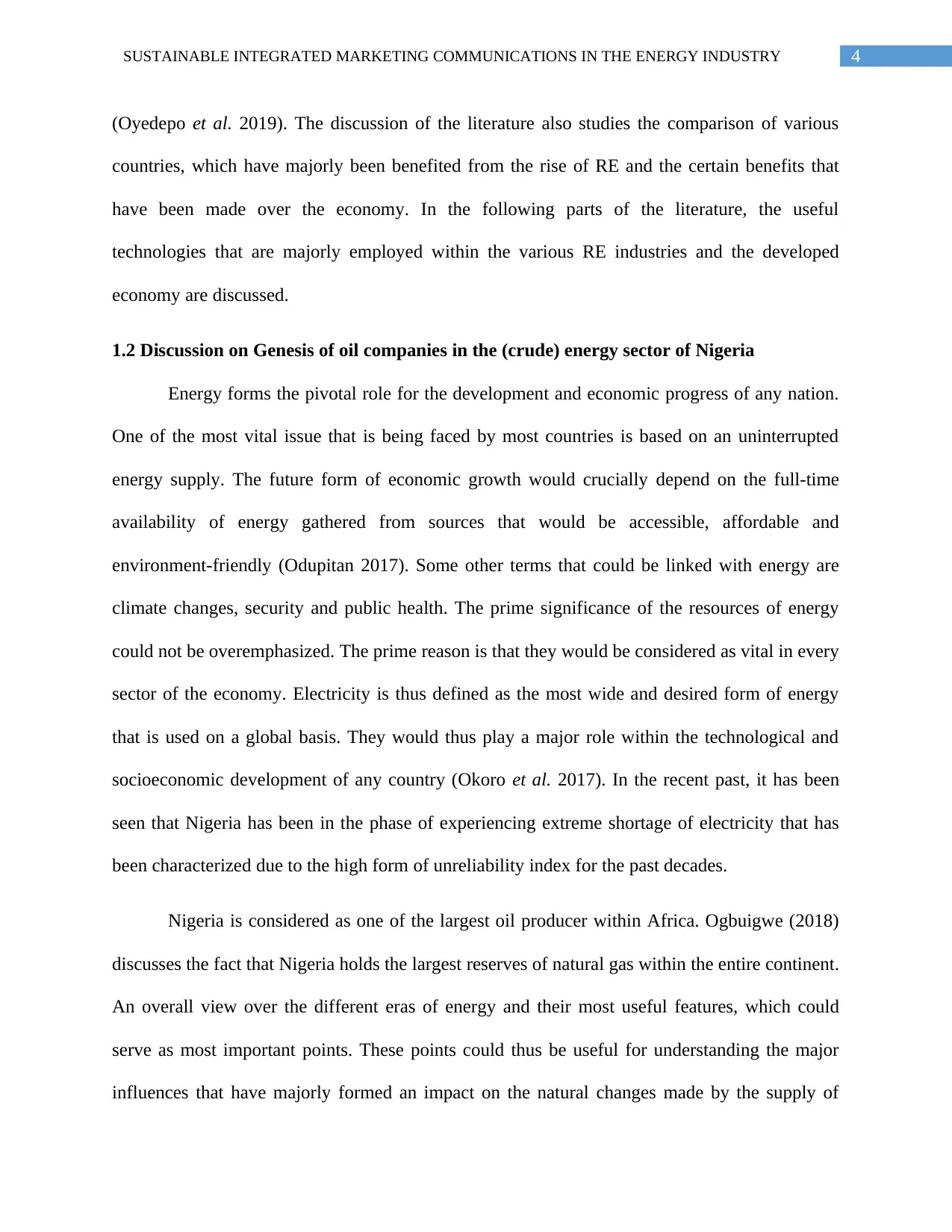
4SUSTAINABLE INTEGRATED MARKETING COMMUNICATIONS IN THE ENERGY INDUSTRY
(Oyedepo et al. 2019). The discussion of the literature also studies the comparison of various
countries, which have majorly been benefited from the rise of RE and the certain benefits that
have been made over the economy. In the following parts of the literature, the useful
technologies that are majorly employed within the various RE industries and the developed
economy are discussed.
1.2 Discussion on Genesis of oil companies in the (crude) energy sector of Nigeria
Energy forms the pivotal role for the development and economic progress of any nation.
One of the most vital issue that is being faced by most countries is based on an uninterrupted
energy supply. The future form of economic growth would crucially depend on the full-time
availability of energy gathered from sources that would be accessible, affordable and
environment-friendly (Odupitan 2017). Some other terms that could be linked with energy are
climate changes, security and public health. The prime significance of the resources of energy
could not be overemphasized. The prime reason is that they would be considered as vital in every
sector of the economy. Electricity is thus defined as the most wide and desired form of energy
that is used on a global basis. They would thus play a major role within the technological and
socioeconomic development of any country (Okoro et al. 2017). In the recent past, it has been
seen that Nigeria has been in the phase of experiencing extreme shortage of electricity that has
been characterized due to the high form of unreliability index for the past decades.
Nigeria is considered as one of the largest oil producer within Africa. Ogbuigwe (2018)
discusses the fact that Nigeria holds the largest reserves of natural gas within the entire continent.
An overall view over the different eras of energy and their most useful features, which could
serve as most important points. These points could thus be useful for understanding the major
influences that have majorly formed an impact on the natural changes made by the supply of
(Oyedepo et al. 2019). The discussion of the literature also studies the comparison of various
countries, which have majorly been benefited from the rise of RE and the certain benefits that
have been made over the economy. In the following parts of the literature, the useful
technologies that are majorly employed within the various RE industries and the developed
economy are discussed.
1.2 Discussion on Genesis of oil companies in the (crude) energy sector of Nigeria
Energy forms the pivotal role for the development and economic progress of any nation.
One of the most vital issue that is being faced by most countries is based on an uninterrupted
energy supply. The future form of economic growth would crucially depend on the full-time
availability of energy gathered from sources that would be accessible, affordable and
environment-friendly (Odupitan 2017). Some other terms that could be linked with energy are
climate changes, security and public health. The prime significance of the resources of energy
could not be overemphasized. The prime reason is that they would be considered as vital in every
sector of the economy. Electricity is thus defined as the most wide and desired form of energy
that is used on a global basis. They would thus play a major role within the technological and
socioeconomic development of any country (Okoro et al. 2017). In the recent past, it has been
seen that Nigeria has been in the phase of experiencing extreme shortage of electricity that has
been characterized due to the high form of unreliability index for the past decades.
Nigeria is considered as one of the largest oil producer within Africa. Ogbuigwe (2018)
discusses the fact that Nigeria holds the largest reserves of natural gas within the entire continent.
An overall view over the different eras of energy and their most useful features, which could
serve as most important points. These points could thus be useful for understanding the major
influences that have majorly formed an impact on the natural changes made by the supply of
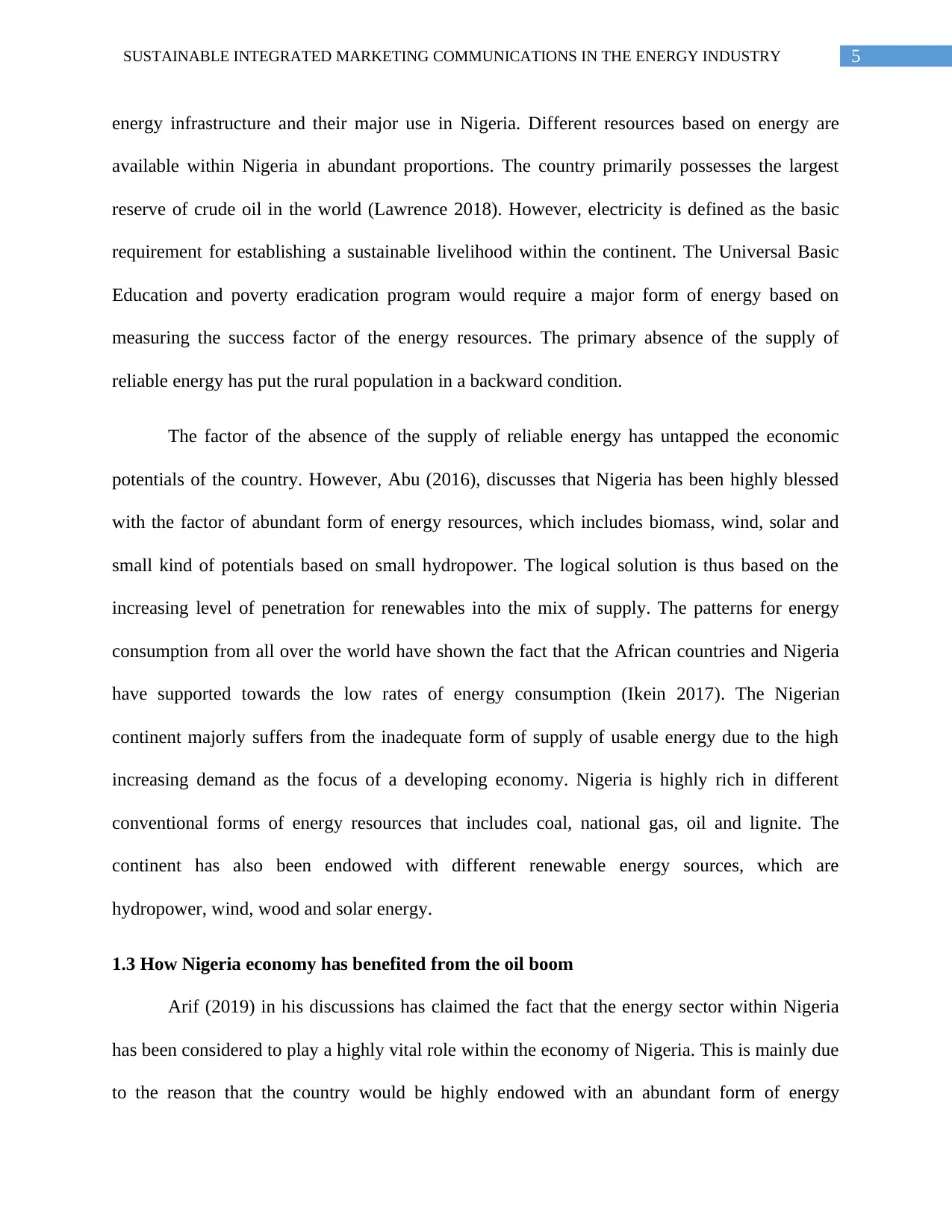
5SUSTAINABLE INTEGRATED MARKETING COMMUNICATIONS IN THE ENERGY INDUSTRY
energy infrastructure and their major use in Nigeria. Different resources based on energy are
available within Nigeria in abundant proportions. The country primarily possesses the largest
reserve of crude oil in the world (Lawrence 2018). However, electricity is defined as the basic
requirement for establishing a sustainable livelihood within the continent. The Universal Basic
Education and poverty eradication program would require a major form of energy based on
measuring the success factor of the energy resources. The primary absence of the supply of
reliable energy has put the rural population in a backward condition.
The factor of the absence of the supply of reliable energy has untapped the economic
potentials of the country. However, Abu (2016), discusses that Nigeria has been highly blessed
with the factor of abundant form of energy resources, which includes biomass, wind, solar and
small kind of potentials based on small hydropower. The logical solution is thus based on the
increasing level of penetration for renewables into the mix of supply. The patterns for energy
consumption from all over the world have shown the fact that the African countries and Nigeria
have supported towards the low rates of energy consumption (Ikein 2017). The Nigerian
continent majorly suffers from the inadequate form of supply of usable energy due to the high
increasing demand as the focus of a developing economy. Nigeria is highly rich in different
conventional forms of energy resources that includes coal, national gas, oil and lignite. The
continent has also been endowed with different renewable energy sources, which are
hydropower, wind, wood and solar energy.
1.3 How Nigeria economy has benefited from the oil boom
Arif (2019) in his discussions has claimed the fact that the energy sector within Nigeria
has been considered to play a highly vital role within the economy of Nigeria. This is mainly due
to the reason that the country would be highly endowed with an abundant form of energy
energy infrastructure and their major use in Nigeria. Different resources based on energy are
available within Nigeria in abundant proportions. The country primarily possesses the largest
reserve of crude oil in the world (Lawrence 2018). However, electricity is defined as the basic
requirement for establishing a sustainable livelihood within the continent. The Universal Basic
Education and poverty eradication program would require a major form of energy based on
measuring the success factor of the energy resources. The primary absence of the supply of
reliable energy has put the rural population in a backward condition.
The factor of the absence of the supply of reliable energy has untapped the economic
potentials of the country. However, Abu (2016), discusses that Nigeria has been highly blessed
with the factor of abundant form of energy resources, which includes biomass, wind, solar and
small kind of potentials based on small hydropower. The logical solution is thus based on the
increasing level of penetration for renewables into the mix of supply. The patterns for energy
consumption from all over the world have shown the fact that the African countries and Nigeria
have supported towards the low rates of energy consumption (Ikein 2017). The Nigerian
continent majorly suffers from the inadequate form of supply of usable energy due to the high
increasing demand as the focus of a developing economy. Nigeria is highly rich in different
conventional forms of energy resources that includes coal, national gas, oil and lignite. The
continent has also been endowed with different renewable energy sources, which are
hydropower, wind, wood and solar energy.
1.3 How Nigeria economy has benefited from the oil boom
Arif (2019) in his discussions has claimed the fact that the energy sector within Nigeria
has been considered to play a highly vital role within the economy of Nigeria. This is mainly due
to the reason that the country would be highly endowed with an abundant form of energy
⊘ This is a preview!⊘
Do you want full access?
Subscribe today to unlock all pages.

Trusted by 1+ million students worldwide
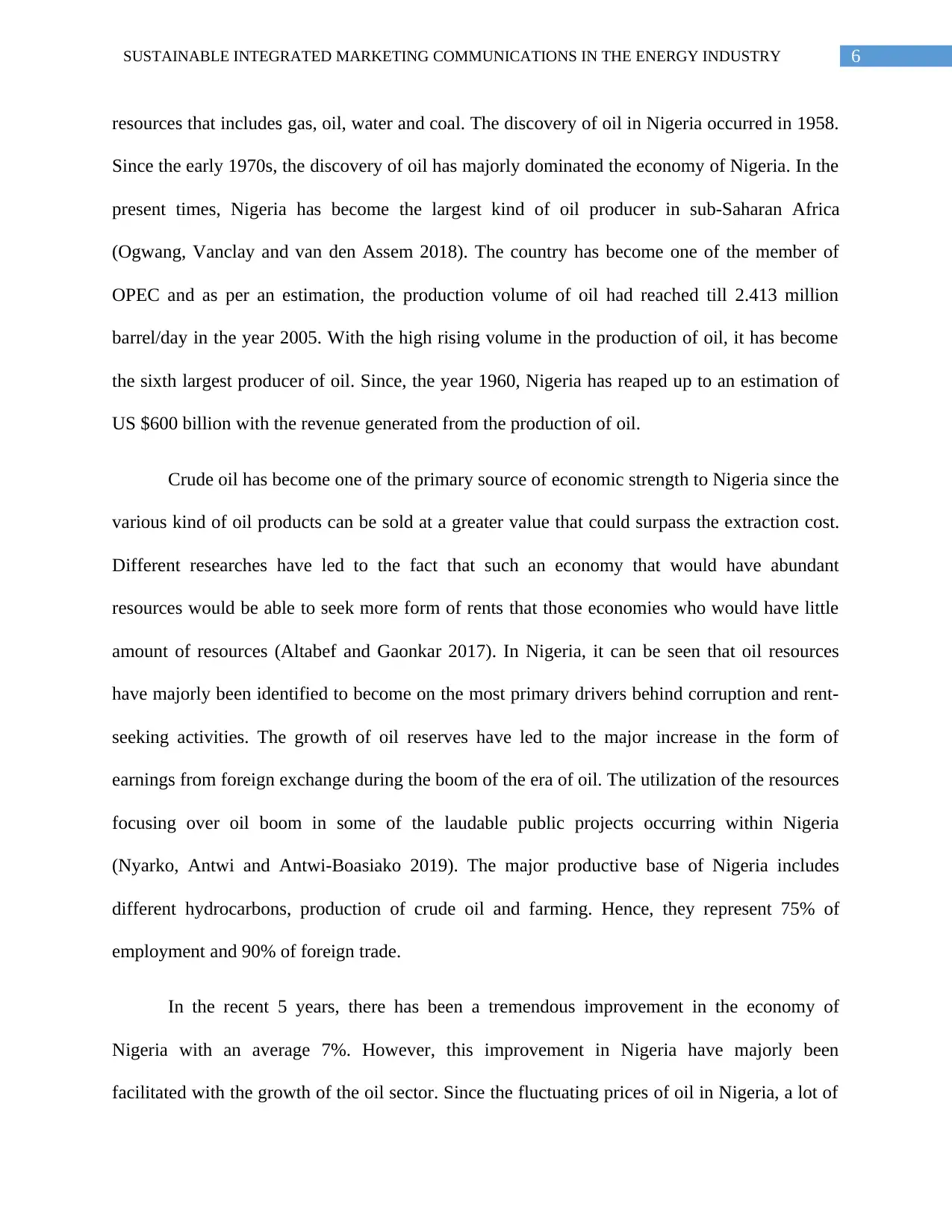
6SUSTAINABLE INTEGRATED MARKETING COMMUNICATIONS IN THE ENERGY INDUSTRY
resources that includes gas, oil, water and coal. The discovery of oil in Nigeria occurred in 1958.
Since the early 1970s, the discovery of oil has majorly dominated the economy of Nigeria. In the
present times, Nigeria has become the largest kind of oil producer in sub-Saharan Africa
(Ogwang, Vanclay and van den Assem 2018). The country has become one of the member of
OPEC and as per an estimation, the production volume of oil had reached till 2.413 million
barrel/day in the year 2005. With the high rising volume in the production of oil, it has become
the sixth largest producer of oil. Since, the year 1960, Nigeria has reaped up to an estimation of
US $600 billion with the revenue generated from the production of oil.
Crude oil has become one of the primary source of economic strength to Nigeria since the
various kind of oil products can be sold at a greater value that could surpass the extraction cost.
Different researches have led to the fact that such an economy that would have abundant
resources would be able to seek more form of rents that those economies who would have little
amount of resources (Altabef and Gaonkar 2017). In Nigeria, it can be seen that oil resources
have majorly been identified to become on the most primary drivers behind corruption and rent-
seeking activities. The growth of oil reserves have led to the major increase in the form of
earnings from foreign exchange during the boom of the era of oil. The utilization of the resources
focusing over oil boom in some of the laudable public projects occurring within Nigeria
(Nyarko, Antwi and Antwi-Boasiako 2019). The major productive base of Nigeria includes
different hydrocarbons, production of crude oil and farming. Hence, they represent 75% of
employment and 90% of foreign trade.
In the recent 5 years, there has been a tremendous improvement in the economy of
Nigeria with an average 7%. However, this improvement in Nigeria have majorly been
facilitated with the growth of the oil sector. Since the fluctuating prices of oil in Nigeria, a lot of
resources that includes gas, oil, water and coal. The discovery of oil in Nigeria occurred in 1958.
Since the early 1970s, the discovery of oil has majorly dominated the economy of Nigeria. In the
present times, Nigeria has become the largest kind of oil producer in sub-Saharan Africa
(Ogwang, Vanclay and van den Assem 2018). The country has become one of the member of
OPEC and as per an estimation, the production volume of oil had reached till 2.413 million
barrel/day in the year 2005. With the high rising volume in the production of oil, it has become
the sixth largest producer of oil. Since, the year 1960, Nigeria has reaped up to an estimation of
US $600 billion with the revenue generated from the production of oil.
Crude oil has become one of the primary source of economic strength to Nigeria since the
various kind of oil products can be sold at a greater value that could surpass the extraction cost.
Different researches have led to the fact that such an economy that would have abundant
resources would be able to seek more form of rents that those economies who would have little
amount of resources (Altabef and Gaonkar 2017). In Nigeria, it can be seen that oil resources
have majorly been identified to become on the most primary drivers behind corruption and rent-
seeking activities. The growth of oil reserves have led to the major increase in the form of
earnings from foreign exchange during the boom of the era of oil. The utilization of the resources
focusing over oil boom in some of the laudable public projects occurring within Nigeria
(Nyarko, Antwi and Antwi-Boasiako 2019). The major productive base of Nigeria includes
different hydrocarbons, production of crude oil and farming. Hence, they represent 75% of
employment and 90% of foreign trade.
In the recent 5 years, there has been a tremendous improvement in the economy of
Nigeria with an average 7%. However, this improvement in Nigeria have majorly been
facilitated with the growth of the oil sector. Since the fluctuating prices of oil in Nigeria, a lot of
Paraphrase This Document
Need a fresh take? Get an instant paraphrase of this document with our AI Paraphraser
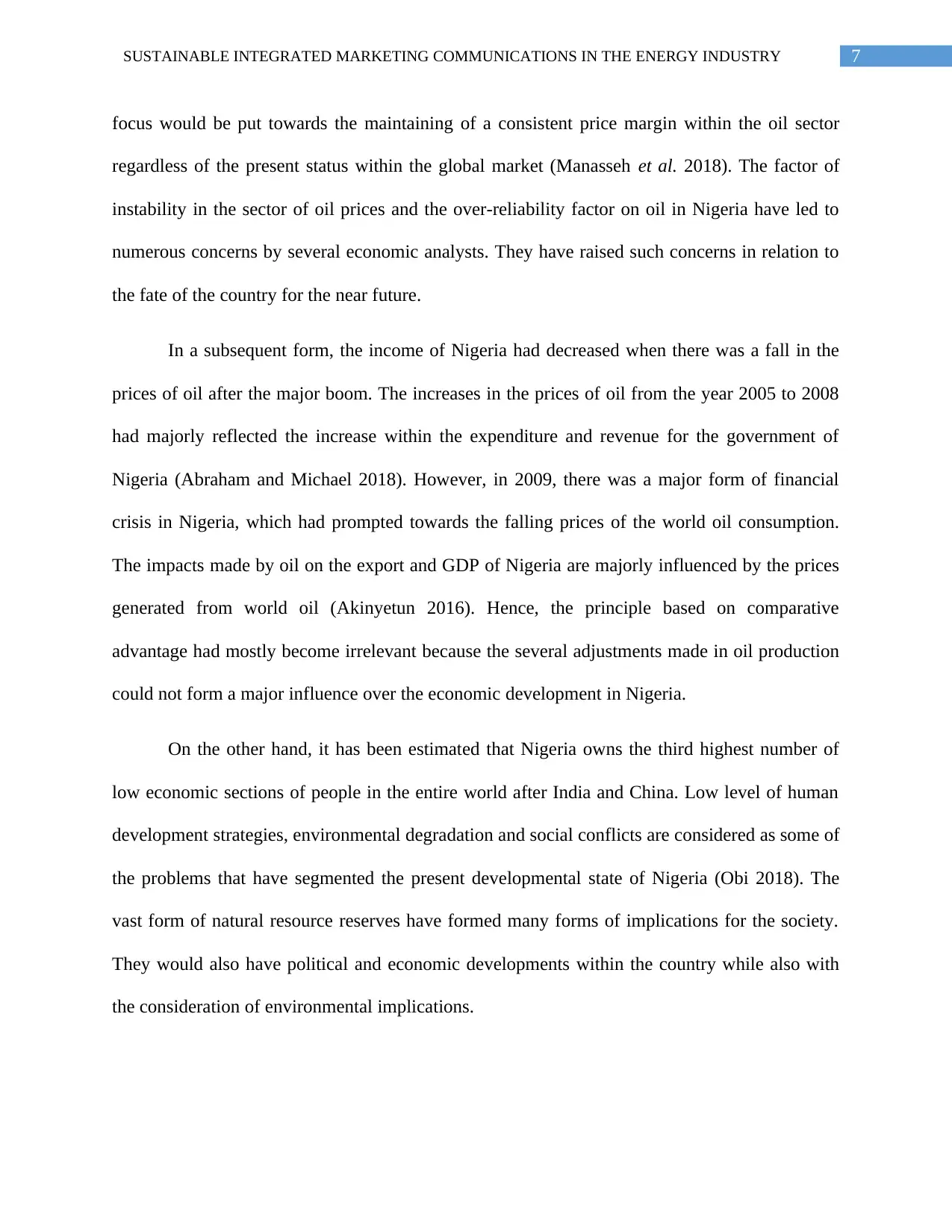
7SUSTAINABLE INTEGRATED MARKETING COMMUNICATIONS IN THE ENERGY INDUSTRY
focus would be put towards the maintaining of a consistent price margin within the oil sector
regardless of the present status within the global market (Manasseh et al. 2018). The factor of
instability in the sector of oil prices and the over-reliability factor on oil in Nigeria have led to
numerous concerns by several economic analysts. They have raised such concerns in relation to
the fate of the country for the near future.
In a subsequent form, the income of Nigeria had decreased when there was a fall in the
prices of oil after the major boom. The increases in the prices of oil from the year 2005 to 2008
had majorly reflected the increase within the expenditure and revenue for the government of
Nigeria (Abraham and Michael 2018). However, in 2009, there was a major form of financial
crisis in Nigeria, which had prompted towards the falling prices of the world oil consumption.
The impacts made by oil on the export and GDP of Nigeria are majorly influenced by the prices
generated from world oil (Akinyetun 2016). Hence, the principle based on comparative
advantage had mostly become irrelevant because the several adjustments made in oil production
could not form a major influence over the economic development in Nigeria.
On the other hand, it has been estimated that Nigeria owns the third highest number of
low economic sections of people in the entire world after India and China. Low level of human
development strategies, environmental degradation and social conflicts are considered as some of
the problems that have segmented the present developmental state of Nigeria (Obi 2018). The
vast form of natural resource reserves have formed many forms of implications for the society.
They would also have political and economic developments within the country while also with
the consideration of environmental implications.
focus would be put towards the maintaining of a consistent price margin within the oil sector
regardless of the present status within the global market (Manasseh et al. 2018). The factor of
instability in the sector of oil prices and the over-reliability factor on oil in Nigeria have led to
numerous concerns by several economic analysts. They have raised such concerns in relation to
the fate of the country for the near future.
In a subsequent form, the income of Nigeria had decreased when there was a fall in the
prices of oil after the major boom. The increases in the prices of oil from the year 2005 to 2008
had majorly reflected the increase within the expenditure and revenue for the government of
Nigeria (Abraham and Michael 2018). However, in 2009, there was a major form of financial
crisis in Nigeria, which had prompted towards the falling prices of the world oil consumption.
The impacts made by oil on the export and GDP of Nigeria are majorly influenced by the prices
generated from world oil (Akinyetun 2016). Hence, the principle based on comparative
advantage had mostly become irrelevant because the several adjustments made in oil production
could not form a major influence over the economic development in Nigeria.
On the other hand, it has been estimated that Nigeria owns the third highest number of
low economic sections of people in the entire world after India and China. Low level of human
development strategies, environmental degradation and social conflicts are considered as some of
the problems that have segmented the present developmental state of Nigeria (Obi 2018). The
vast form of natural resource reserves have formed many forms of implications for the society.
They would also have political and economic developments within the country while also with
the consideration of environmental implications.
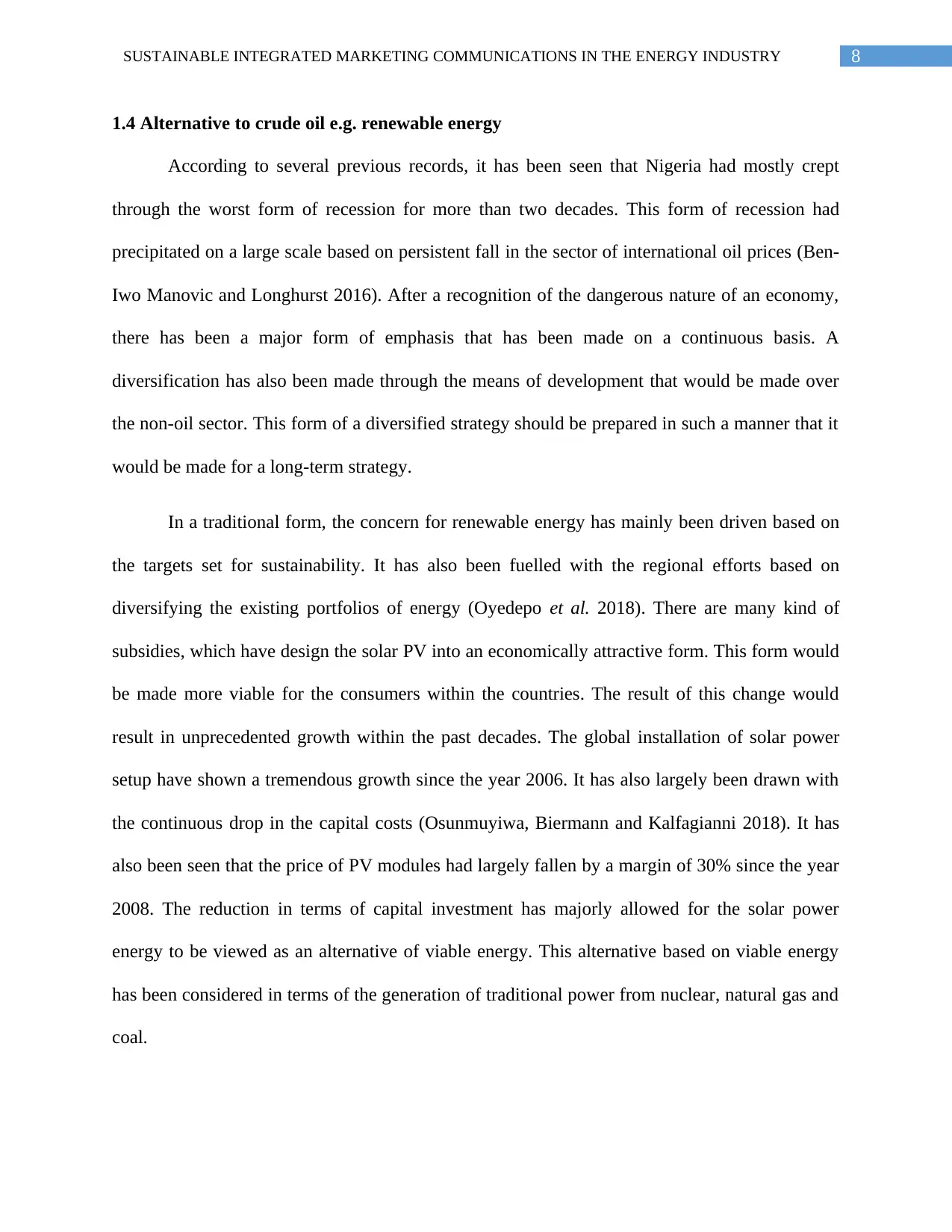
8SUSTAINABLE INTEGRATED MARKETING COMMUNICATIONS IN THE ENERGY INDUSTRY
1.4 Alternative to crude oil e.g. renewable energy
According to several previous records, it has been seen that Nigeria had mostly crept
through the worst form of recession for more than two decades. This form of recession had
precipitated on a large scale based on persistent fall in the sector of international oil prices (Ben-
Iwo Manovic and Longhurst 2016). After a recognition of the dangerous nature of an economy,
there has been a major form of emphasis that has been made on a continuous basis. A
diversification has also been made through the means of development that would be made over
the non-oil sector. This form of a diversified strategy should be prepared in such a manner that it
would be made for a long-term strategy.
In a traditional form, the concern for renewable energy has mainly been driven based on
the targets set for sustainability. It has also been fuelled with the regional efforts based on
diversifying the existing portfolios of energy (Oyedepo et al. 2018). There are many kind of
subsidies, which have design the solar PV into an economically attractive form. This form would
be made more viable for the consumers within the countries. The result of this change would
result in unprecedented growth within the past decades. The global installation of solar power
setup have shown a tremendous growth since the year 2006. It has also largely been drawn with
the continuous drop in the capital costs (Osunmuyiwa, Biermann and Kalfagianni 2018). It has
also been seen that the price of PV modules had largely fallen by a margin of 30% since the year
2008. The reduction in terms of capital investment has majorly allowed for the solar power
energy to be viewed as an alternative of viable energy. This alternative based on viable energy
has been considered in terms of the generation of traditional power from nuclear, natural gas and
coal.
1.4 Alternative to crude oil e.g. renewable energy
According to several previous records, it has been seen that Nigeria had mostly crept
through the worst form of recession for more than two decades. This form of recession had
precipitated on a large scale based on persistent fall in the sector of international oil prices (Ben-
Iwo Manovic and Longhurst 2016). After a recognition of the dangerous nature of an economy,
there has been a major form of emphasis that has been made on a continuous basis. A
diversification has also been made through the means of development that would be made over
the non-oil sector. This form of a diversified strategy should be prepared in such a manner that it
would be made for a long-term strategy.
In a traditional form, the concern for renewable energy has mainly been driven based on
the targets set for sustainability. It has also been fuelled with the regional efforts based on
diversifying the existing portfolios of energy (Oyedepo et al. 2018). There are many kind of
subsidies, which have design the solar PV into an economically attractive form. This form would
be made more viable for the consumers within the countries. The result of this change would
result in unprecedented growth within the past decades. The global installation of solar power
setup have shown a tremendous growth since the year 2006. It has also largely been drawn with
the continuous drop in the capital costs (Osunmuyiwa, Biermann and Kalfagianni 2018). It has
also been seen that the price of PV modules had largely fallen by a margin of 30% since the year
2008. The reduction in terms of capital investment has majorly allowed for the solar power
energy to be viewed as an alternative of viable energy. This alternative based on viable energy
has been considered in terms of the generation of traditional power from nuclear, natural gas and
coal.
⊘ This is a preview!⊘
Do you want full access?
Subscribe today to unlock all pages.

Trusted by 1+ million students worldwide
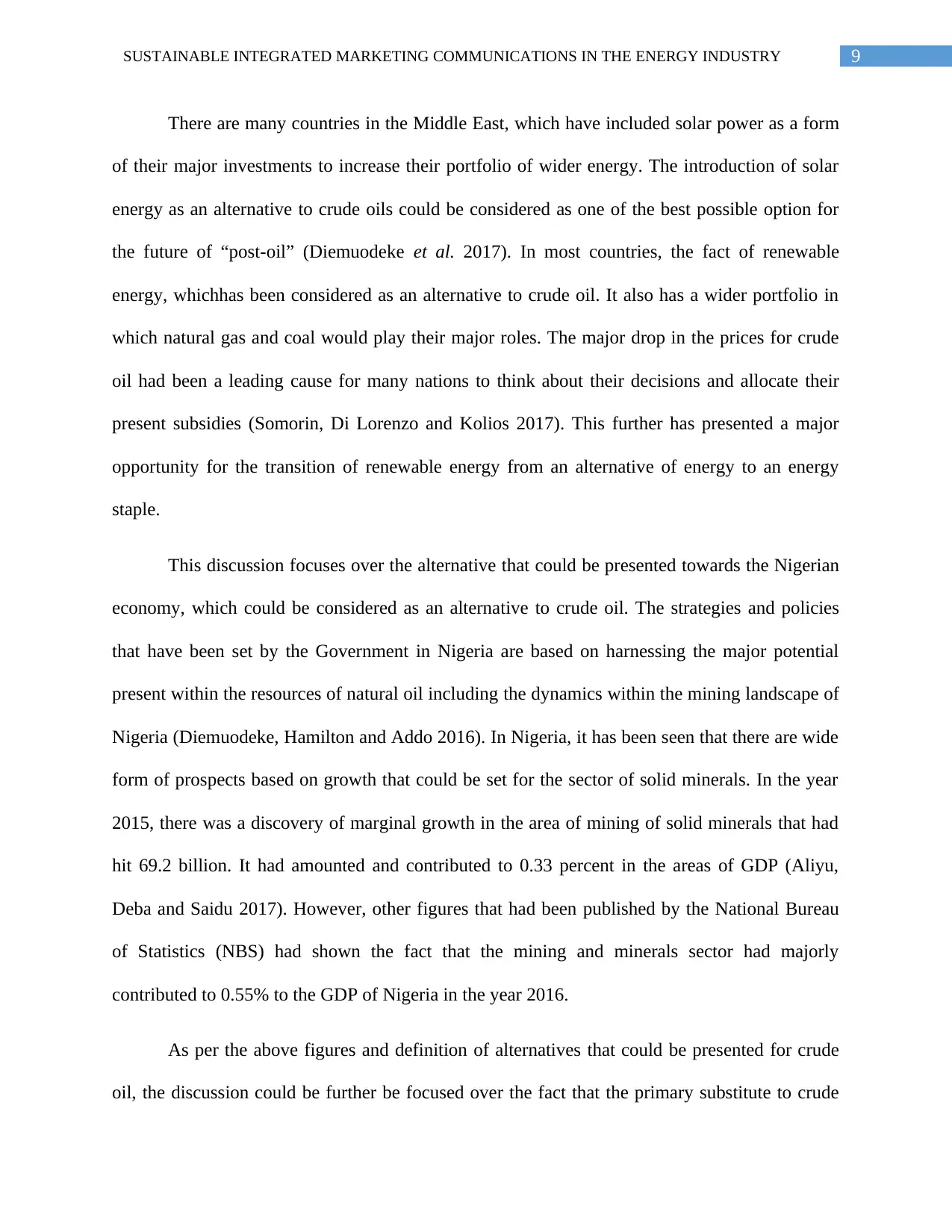
9SUSTAINABLE INTEGRATED MARKETING COMMUNICATIONS IN THE ENERGY INDUSTRY
There are many countries in the Middle East, which have included solar power as a form
of their major investments to increase their portfolio of wider energy. The introduction of solar
energy as an alternative to crude oils could be considered as one of the best possible option for
the future of “post-oil” (Diemuodeke et al. 2017). In most countries, the fact of renewable
energy, whichhas been considered as an alternative to crude oil. It also has a wider portfolio in
which natural gas and coal would play their major roles. The major drop in the prices for crude
oil had been a leading cause for many nations to think about their decisions and allocate their
present subsidies (Somorin, Di Lorenzo and Kolios 2017). This further has presented a major
opportunity for the transition of renewable energy from an alternative of energy to an energy
staple.
This discussion focuses over the alternative that could be presented towards the Nigerian
economy, which could be considered as an alternative to crude oil. The strategies and policies
that have been set by the Government in Nigeria are based on harnessing the major potential
present within the resources of natural oil including the dynamics within the mining landscape of
Nigeria (Diemuodeke, Hamilton and Addo 2016). In Nigeria, it has been seen that there are wide
form of prospects based on growth that could be set for the sector of solid minerals. In the year
2015, there was a discovery of marginal growth in the area of mining of solid minerals that had
hit 69.2 billion. It had amounted and contributed to 0.33 percent in the areas of GDP (Aliyu,
Deba and Saidu 2017). However, other figures that had been published by the National Bureau
of Statistics (NBS) had shown the fact that the mining and minerals sector had majorly
contributed to 0.55% to the GDP of Nigeria in the year 2016.
As per the above figures and definition of alternatives that could be presented for crude
oil, the discussion could be further be focused over the fact that the primary substitute to crude
There are many countries in the Middle East, which have included solar power as a form
of their major investments to increase their portfolio of wider energy. The introduction of solar
energy as an alternative to crude oils could be considered as one of the best possible option for
the future of “post-oil” (Diemuodeke et al. 2017). In most countries, the fact of renewable
energy, whichhas been considered as an alternative to crude oil. It also has a wider portfolio in
which natural gas and coal would play their major roles. The major drop in the prices for crude
oil had been a leading cause for many nations to think about their decisions and allocate their
present subsidies (Somorin, Di Lorenzo and Kolios 2017). This further has presented a major
opportunity for the transition of renewable energy from an alternative of energy to an energy
staple.
This discussion focuses over the alternative that could be presented towards the Nigerian
economy, which could be considered as an alternative to crude oil. The strategies and policies
that have been set by the Government in Nigeria are based on harnessing the major potential
present within the resources of natural oil including the dynamics within the mining landscape of
Nigeria (Diemuodeke, Hamilton and Addo 2016). In Nigeria, it has been seen that there are wide
form of prospects based on growth that could be set for the sector of solid minerals. In the year
2015, there was a discovery of marginal growth in the area of mining of solid minerals that had
hit 69.2 billion. It had amounted and contributed to 0.33 percent in the areas of GDP (Aliyu,
Deba and Saidu 2017). However, other figures that had been published by the National Bureau
of Statistics (NBS) had shown the fact that the mining and minerals sector had majorly
contributed to 0.55% to the GDP of Nigeria in the year 2016.
As per the above figures and definition of alternatives that could be presented for crude
oil, the discussion could be further be focused over the fact that the primary substitute to crude
Paraphrase This Document
Need a fresh take? Get an instant paraphrase of this document with our AI Paraphraser
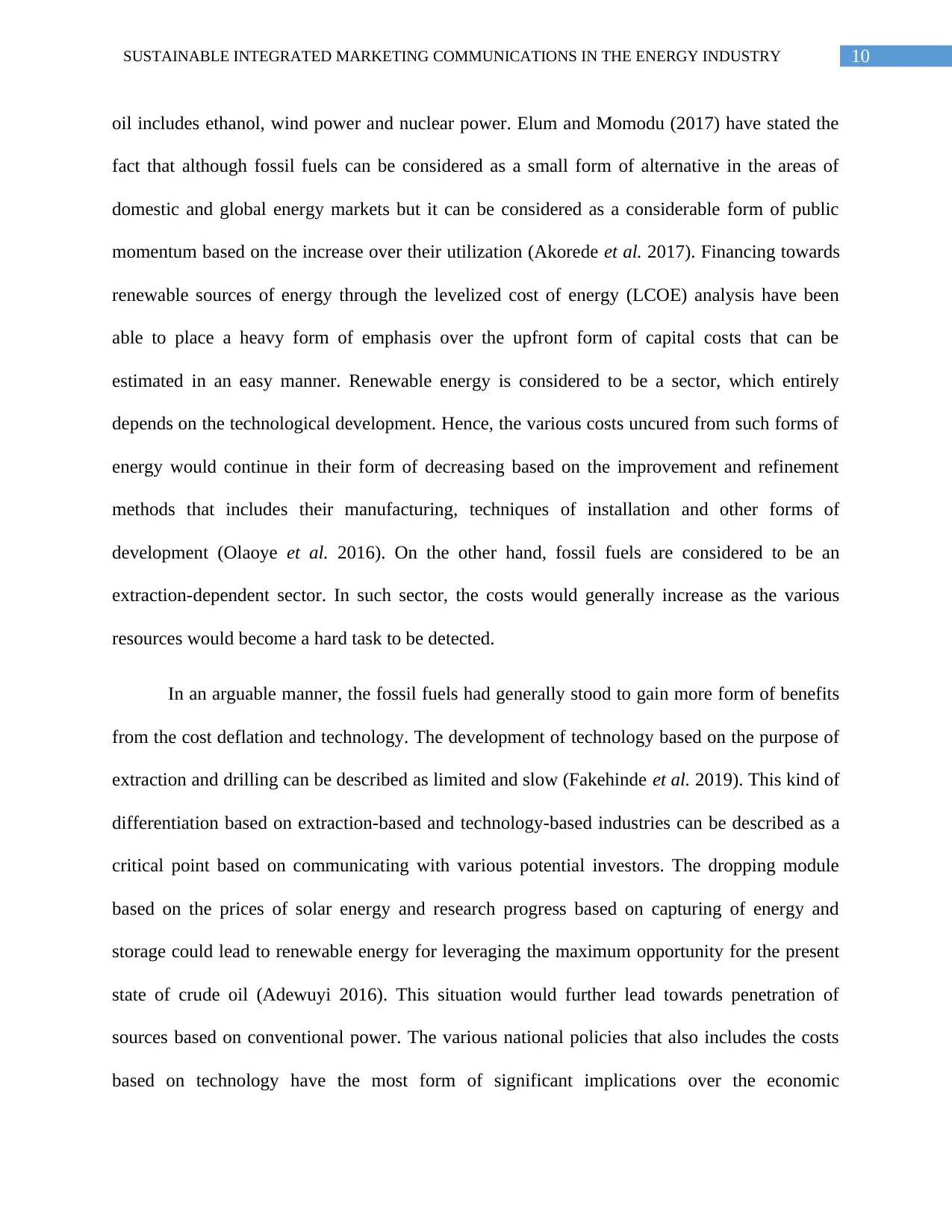
10SUSTAINABLE INTEGRATED MARKETING COMMUNICATIONS IN THE ENERGY INDUSTRY
oil includes ethanol, wind power and nuclear power. Elum and Momodu (2017) have stated the
fact that although fossil fuels can be considered as a small form of alternative in the areas of
domestic and global energy markets but it can be considered as a considerable form of public
momentum based on the increase over their utilization (Akorede et al. 2017). Financing towards
renewable sources of energy through the levelized cost of energy (LCOE) analysis have been
able to place a heavy form of emphasis over the upfront form of capital costs that can be
estimated in an easy manner. Renewable energy is considered to be a sector, which entirely
depends on the technological development. Hence, the various costs uncured from such forms of
energy would continue in their form of decreasing based on the improvement and refinement
methods that includes their manufacturing, techniques of installation and other forms of
development (Olaoye et al. 2016). On the other hand, fossil fuels are considered to be an
extraction-dependent sector. In such sector, the costs would generally increase as the various
resources would become a hard task to be detected.
In an arguable manner, the fossil fuels had generally stood to gain more form of benefits
from the cost deflation and technology. The development of technology based on the purpose of
extraction and drilling can be described as limited and slow (Fakehinde et al. 2019). This kind of
differentiation based on extraction-based and technology-based industries can be described as a
critical point based on communicating with various potential investors. The dropping module
based on the prices of solar energy and research progress based on capturing of energy and
storage could lead to renewable energy for leveraging the maximum opportunity for the present
state of crude oil (Adewuyi 2016). This situation would further lead towards penetration of
sources based on conventional power. The various national policies that also includes the costs
based on technology have the most form of significant implications over the economic
oil includes ethanol, wind power and nuclear power. Elum and Momodu (2017) have stated the
fact that although fossil fuels can be considered as a small form of alternative in the areas of
domestic and global energy markets but it can be considered as a considerable form of public
momentum based on the increase over their utilization (Akorede et al. 2017). Financing towards
renewable sources of energy through the levelized cost of energy (LCOE) analysis have been
able to place a heavy form of emphasis over the upfront form of capital costs that can be
estimated in an easy manner. Renewable energy is considered to be a sector, which entirely
depends on the technological development. Hence, the various costs uncured from such forms of
energy would continue in their form of decreasing based on the improvement and refinement
methods that includes their manufacturing, techniques of installation and other forms of
development (Olaoye et al. 2016). On the other hand, fossil fuels are considered to be an
extraction-dependent sector. In such sector, the costs would generally increase as the various
resources would become a hard task to be detected.
In an arguable manner, the fossil fuels had generally stood to gain more form of benefits
from the cost deflation and technology. The development of technology based on the purpose of
extraction and drilling can be described as limited and slow (Fakehinde et al. 2019). This kind of
differentiation based on extraction-based and technology-based industries can be described as a
critical point based on communicating with various potential investors. The dropping module
based on the prices of solar energy and research progress based on capturing of energy and
storage could lead to renewable energy for leveraging the maximum opportunity for the present
state of crude oil (Adewuyi 2016). This situation would further lead towards penetration of
sources based on conventional power. The various national policies that also includes the costs
based on technology have the most form of significant implications over the economic
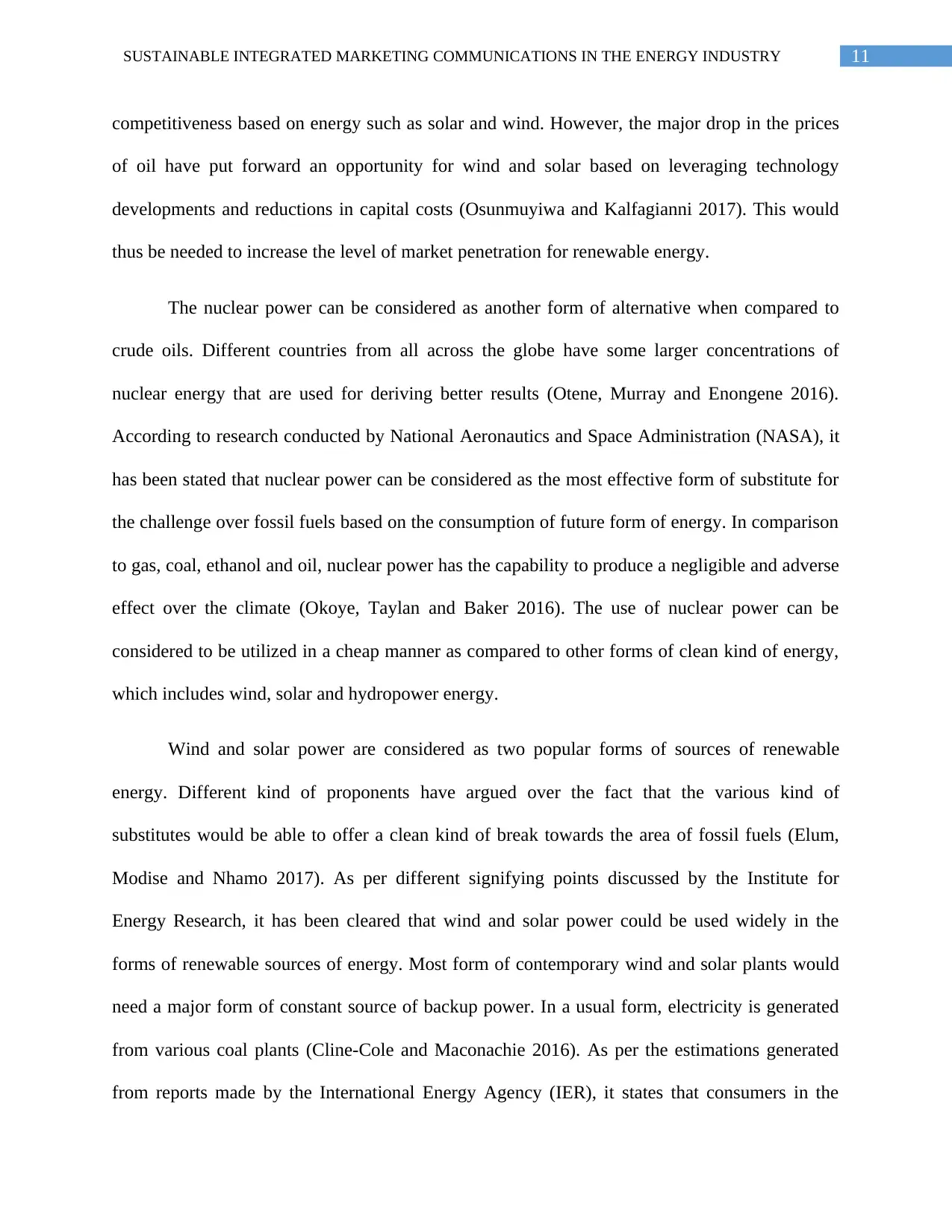
11SUSTAINABLE INTEGRATED MARKETING COMMUNICATIONS IN THE ENERGY INDUSTRY
competitiveness based on energy such as solar and wind. However, the major drop in the prices
of oil have put forward an opportunity for wind and solar based on leveraging technology
developments and reductions in capital costs (Osunmuyiwa and Kalfagianni 2017). This would
thus be needed to increase the level of market penetration for renewable energy.
The nuclear power can be considered as another form of alternative when compared to
crude oils. Different countries from all across the globe have some larger concentrations of
nuclear energy that are used for deriving better results (Otene, Murray and Enongene 2016).
According to research conducted by National Aeronautics and Space Administration (NASA), it
has been stated that nuclear power can be considered as the most effective form of substitute for
the challenge over fossil fuels based on the consumption of future form of energy. In comparison
to gas, coal, ethanol and oil, nuclear power has the capability to produce a negligible and adverse
effect over the climate (Okoye, Taylan and Baker 2016). The use of nuclear power can be
considered to be utilized in a cheap manner as compared to other forms of clean kind of energy,
which includes wind, solar and hydropower energy.
Wind and solar power are considered as two popular forms of sources of renewable
energy. Different kind of proponents have argued over the fact that the various kind of
substitutes would be able to offer a clean kind of break towards the area of fossil fuels (Elum,
Modise and Nhamo 2017). As per different signifying points discussed by the Institute for
Energy Research, it has been cleared that wind and solar power could be used widely in the
forms of renewable sources of energy. Most form of contemporary wind and solar plants would
need a major form of constant source of backup power. In a usual form, electricity is generated
from various coal plants (Cline-Cole and Maconachie 2016). As per the estimations generated
from reports made by the International Energy Agency (IER), it states that consumers in the
competitiveness based on energy such as solar and wind. However, the major drop in the prices
of oil have put forward an opportunity for wind and solar based on leveraging technology
developments and reductions in capital costs (Osunmuyiwa and Kalfagianni 2017). This would
thus be needed to increase the level of market penetration for renewable energy.
The nuclear power can be considered as another form of alternative when compared to
crude oils. Different countries from all across the globe have some larger concentrations of
nuclear energy that are used for deriving better results (Otene, Murray and Enongene 2016).
According to research conducted by National Aeronautics and Space Administration (NASA), it
has been stated that nuclear power can be considered as the most effective form of substitute for
the challenge over fossil fuels based on the consumption of future form of energy. In comparison
to gas, coal, ethanol and oil, nuclear power has the capability to produce a negligible and adverse
effect over the climate (Okoye, Taylan and Baker 2016). The use of nuclear power can be
considered to be utilized in a cheap manner as compared to other forms of clean kind of energy,
which includes wind, solar and hydropower energy.
Wind and solar power are considered as two popular forms of sources of renewable
energy. Different kind of proponents have argued over the fact that the various kind of
substitutes would be able to offer a clean kind of break towards the area of fossil fuels (Elum,
Modise and Nhamo 2017). As per different signifying points discussed by the Institute for
Energy Research, it has been cleared that wind and solar power could be used widely in the
forms of renewable sources of energy. Most form of contemporary wind and solar plants would
need a major form of constant source of backup power. In a usual form, electricity is generated
from various coal plants (Cline-Cole and Maconachie 2016). As per the estimations generated
from reports made by the International Energy Agency (IER), it states that consumers in the
⊘ This is a preview!⊘
Do you want full access?
Subscribe today to unlock all pages.

Trusted by 1+ million students worldwide
1 out of 70
Related Documents
Your All-in-One AI-Powered Toolkit for Academic Success.
+13062052269
info@desklib.com
Available 24*7 on WhatsApp / Email
![[object Object]](/_next/static/media/star-bottom.7253800d.svg)
Unlock your academic potential
Copyright © 2020–2026 A2Z Services. All Rights Reserved. Developed and managed by ZUCOL.





